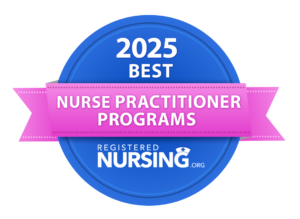Best Online Nurse Practitioner Schools in North Carolina
- 2025 - Best Online Nurse Practitioner Programs in North Carolina
- Fast & Affordable Nurse Practitioner Programs
- Schools Offering Popular Nurse Practitioner Specialties
- Educational Routes for Nurse Practitioners – Online & Campus
- General Admissions Requirements
- North Carolina NP License and Certification Requirements
- List of NP Programs in North Carolina

The role of a registered nurse is a comendable and exciting one, but after a few years of working as an RN, you may decide that you’d like to pursue more advanced and higher-paying positions within the nursing world. One of these types of roles is that of a nurse practitioner. Nurse practitioners are specialized advanced-practice nurses who work in a larger capacity than registered nurses. This often means that they make competitive salaries — sometimes even surpassing physicians. If you’re ready to get started on your new career, you’ll need to find a nurse practitioner in the area where you’re based whether that’s Raleigh or Charlotte or somewhere else in the state. Below is everything you’ll need to learn to get started. Jump to program listings.
2025 - Best Online Nurse Practitioner Programs in North Carolina

RegisteredNursing.org's 2025 Best Online Nurse Practitioner Programs in North Carolina highlights the top online programs available in the state. The rankings are based on important factors such as completion rates, affordability, institutional reputation, program variety, and faculty qualifications. For a comprehensive look at our ranking criteria, visit the methodology page.
University of North Carolina Wilmington
The University of North Carolina Wilmington offers a highly reputable nurse practitioner program through its esteemed School of Nursing. With a focus on evidence-based practice and interdisciplinary collaboration, students are equipped with the knowledge and skills to provide comprehensive and compassionate care to diverse populations. The program also places a strong emphasis on community engagement and global health initiatives, preparing graduates to be leaders in the ever-evolving healthcare field.
DNP Programs- Family Nurse Practitioner BSN-DNP Online/Hybrid
- Adult-Gerontology Primary Care Nurse Practitioner Online/Hybrid
- Psychiatric Mental Health Nurse Practitioner Online/Hybrid
- BSN-DNP Online/Hybrid

Winston-Salem State University
Winston-Salem State University's nursing department offers a comprehensive nurse practitioner program that prepares students to provide advanced, holistic care to diverse populations. Their program philosophies include a strong emphasis on evidence-based practice, cultural competency, and interprofessional collaboration. WSSU's nurse practitioner program is consistently ranked among the top programs in the nation and has a high pass rate on certification exams.
MSN Programs- Family Nurse Practitioners (FNP) Online/Hybrid

Duke University
The Duke University School of Nursing offers highly competitive nurse practitioner programs. The nursing department emphasizes a patient-centered approach, promoting evidence-based practice and interdisciplinary collaboration. With a strong emphasis on clinical experiences, graduates of these programs are well-prepared to provide comprehensive, quality care to diverse populations.
MSN Programs- Family Nurse Practitioner Online/Hybrid
- Adult-Gerontology Nurse Practitioner - Acute Care Online/Hybrid
- Adult-Gerontology Nurse Practitioner - Primary Care Online/Hybrid
- Neonatal Nurse Practitioner Online/Hybrid
- Pediatric Nurse Practitioner - Acute Care Online/Hybrid
- Pediatric Nurse Practitioner - Primary Care Online/Hybrid
- Psychiatric Mental Health NP Online/Hybrid
- Women's Health Nurse Practitioner Online/Hybrid

Fast & Affordable Nurse Practitioner Programs
Regardless of which required degree you want to pursue (a Master of Science in Nursing or a Doctor of Nursing Practice), it goes without saying that you will likely want to save money and time if at all possible. If you’ve flipped through the various types of MSN programs available in North Carolina, you’ll likely see that there are many cheap and quick nurse practitioner programs located right in your area.
What Are the Fastest Online NP Programs?
Getting licensed as a nurse practitioner in two years as opposed to eight years is typically preferable. This is why most nurse practitioners suggest getting your MSN (as opposed to a DNP) if your main goal is to get licensed and start working as soon as possible. MSNs in North Carolina can be completed in as little as 2 years or even less if you have a Bachelor of Science in Nursing (BSN) with transferable credits. Here are a few located in North Carolina:
| NP Program | Length | Online/Campus |
|---|---|---|
| Winston-Salem State University | 2 Years | Campus |
| Belmont Abbey College | 12 – 18 Months | Online |
| University of North Carolina Wilmington | 12 Months | Online |
What Are the Most Affordable Online NP Programs?
If you’ve already undergone a nursing program, you know that they can get pretty pricey especially once you tally up the hidden costs. If you’re going back to school, you’ll likely want to save as much money as possible. Here are a few of the most affordable nurse practitioner programs located in North Carolina:
| School Name | Tuition Range | Estimated Credits |
|---|---|---|
| University of North Carolina, Pembroke | $9,273 | 39 |
| Western North Carolina | $11,000 – $22,000 | 38 – 39 |
| Fayetteville State University | $13,000 – $63,000 | 36 |
Schools Offering Popular Nurse Practitioner Specialties
Apart from the higher pay, you can also look forward to specialized nurse practitioner degree programs which allow you to get certified in a variety of exciting practice areas upon graduation. These types of nurse practitioner specializations (and many more) are available in in North Carolina:
| School Name | NP Specialty | Credits Required |
|---|---|---|
| East Carolina University | Neonatal Nurse Practitioner | 42 |
| University of North Carolina | Psych-Mental Health Nurse Practitioner | 58 |
| Duke University | Pediatric Primary Care Nurse Practitioner | 43 |
Find out more about popular NP specialty programs: Acute Care (ACNP), Adult Gerontology (AGNP), Family (FNP), Pediatric (PNP), Psychiatric (PHMNP), Women’s Health (WHNP).
Educational Routes for Nurse Practitioners – Online & Campus
Beyond the traditional programs like MSN and DNP programs, there are also many other types of accelerated and bridge programs that you may be interested in depending on your individual background and the level of degree and experience you already have.
MSN Nurse Practitioner Programs
Traditional Master of Science in Nursing (MSN) programs are one of the most common NP degrees. They are available in many NP specializations and take about two years to complete. You can find these types of degrees at:
- Winston-Salem State University – Winston-Salem, NC
- University of North Carolina Wilmington – Wilmington, NC
RN to NP Programs
RN to NP programs are an umbrella term that typically refers to ADN to MSNs, in which RNs who hold an Associate's Degree in Nursing (ADN) complete accelerated BSN and MSN-level nurse practitioner coursework. In North Carolina, these types of programs are avaialble at:
- University of North Carolina, Pembroke – Pembroke, NC
- University of North Carolina, Charlotte – Charlotte, NC
DNP Nurse Practioner Programs
Doctor of Nursing Practice (DNP)s are the highest degree an NP can obtain. These programs can take 4-6 years to complete, depending on the education level they enter with. Traditional DNP programs require students to have an accredited MSN degree. Here are some examples located in North Carolina:
- University of North Carolina – Chapel Hill, NC
- Western Carolina University – Cullowhee, NC
Post-Master's Certificate NP Programs
A Post-Master's Nursing Certificate is designed for MSN-educated nurse who want to enter or switch to a new NP specialty. While not a degree in and of itself, they’re a shorter and often more affordable way for eligible nurses to gain NP training, typically completed in a year or less. North Carolina examples include:
- East Carolina University – Greenville, NC
- University of North Carolina – Chapel Hill, NC
Accelerated, Direct & Master’s Entry (MENP/MEPN) to Nursing Practice
A Master's Entry to Nursing Practice (MENP) program, also called direct-entry or accelerated MSN programs, allows non-nurses with a bachelor's degree in any subject to enter directly into an MSN program. These programs essentially combine BSN and MSN coursework into one rigorous program. Here are some examples in North Carolina:
- University of North Carolina – Chapel Hill, NC
- East Carolina University – Greenville, NC
General Admissions Requirements
While each specific nurse practitioner degree level will have its own set of requirements, most NP programs will require the following to be eligible for admission:
- BSN from an accredited school
- Transcripts from all colleges attended
- Minimum grade point average (often 3.0 or above, but varies by school/program)
- Active, unencumbered RN license
- Essay or statement of purpose outlining career goals
- Letters of recommendation (academic or professional)
- Resume or CV
North Carolina NP License and Certification Requirements
Becoming a nurse practitioner in North Carolina involves meeting specific qualifications to ensure that candidates are well-prepared for the role. The essential eligibility requirements include:
- Active RN License: Applicants must hold a valid, unencumbered registered nurse license issued by the North Carolina Board of Nursing.
- Completion of an Accredited Program: Candidates must graduate from a nationally accredited nurse practitioner program that includes both clinical and theoretical training in a specialty area.
To begin the application process, aspiring NPs must provide documentation verifying their RN license and academic qualifications, as well as submit official transcripts and clinical training records. Along with these materials, candidates must complete the state's application form and pay an application fee, which generally falls around $110. Comprehensive instructions for NP licensure and certification can be found through the North Carolina Board of Nursing's online portal.
NPs in North Carolina are also required to obtain national certification in their chosen specialty, which can be achieved through certifying bodies such as the American Nurses Credentialing Center (ANCC) or other approved organizations. Certification generally requires that candidates hold a current RN license and have graduated from a master’s or doctoral-level nursing program that aligns with their specialty. Passing a national certification exam is also typically necessary.
Unlike some states, North Carolina does not currently grant full practice authority to nurse practitioners. This means that while NPs have a broad scope of practice, they are required to maintain a collaborative agreement with a supervising physician in order to practice and prescribe medications. However, NPs can still play an integral role in patient care across various healthcare settings. The North Carolina Nurses Association (NCNA) offers further resources, including updates on any potential changes to practice authority, continuing education, and advocacy efforts for the NP profession in the state.
List of NP Programs in North Carolina
Chapel Hill, NC
The University Of North Carolina At Chapel Hill
Chapel Hill, NC 27599
(919) 962-2211
Charlotte, NC
University of North Carolina at Charlotte
Charlotte, NC 28223
(704) 687-8622
Cullowhee, NC
Western Carolina University
- Family Nurse Practitioner Campus
Cullowhee, NC 28723
(828) 227-7211
Durham, NC
Duke University
- Women's Health Nurse Practitioner Online
- Psychiatric Mental Health NP Online
- Pediatric Nurse Practitioner - Primary Care Online
- Pediatric Nurse Practitioner - Acute Care Online
- Neonatal Nurse Practitioner Online
- Family Nurse Practitioner Online
- Adult-Gerontology Nurse Practitioner - Acute Care Online
- Adult-Gerontology Nurse Practitioner - Primary Care Online
Durham, NC 27710
(919) 684-3786
Greenville, NC
East Carolina University
- Neonatal Nurse Practitioner Online
- Family Nurse Practitioner Campus
- Gerontology Campus
- Neonatal Nurse Practitioner Online
Greenville, NC 27858
(252) 328-6131
Wilmington, NC
University of North Carolina Wilmington
- BSN-DNP Online
Wilmington, NC 28403
(910) 962-3000
Winston-Salem, NC
Winston-Salem State University
Winston-Salem, NC 27110
(336) 750-2000
Are we missing your school's program or need to update information listed? Please contact us so we can make the necessary changes.
